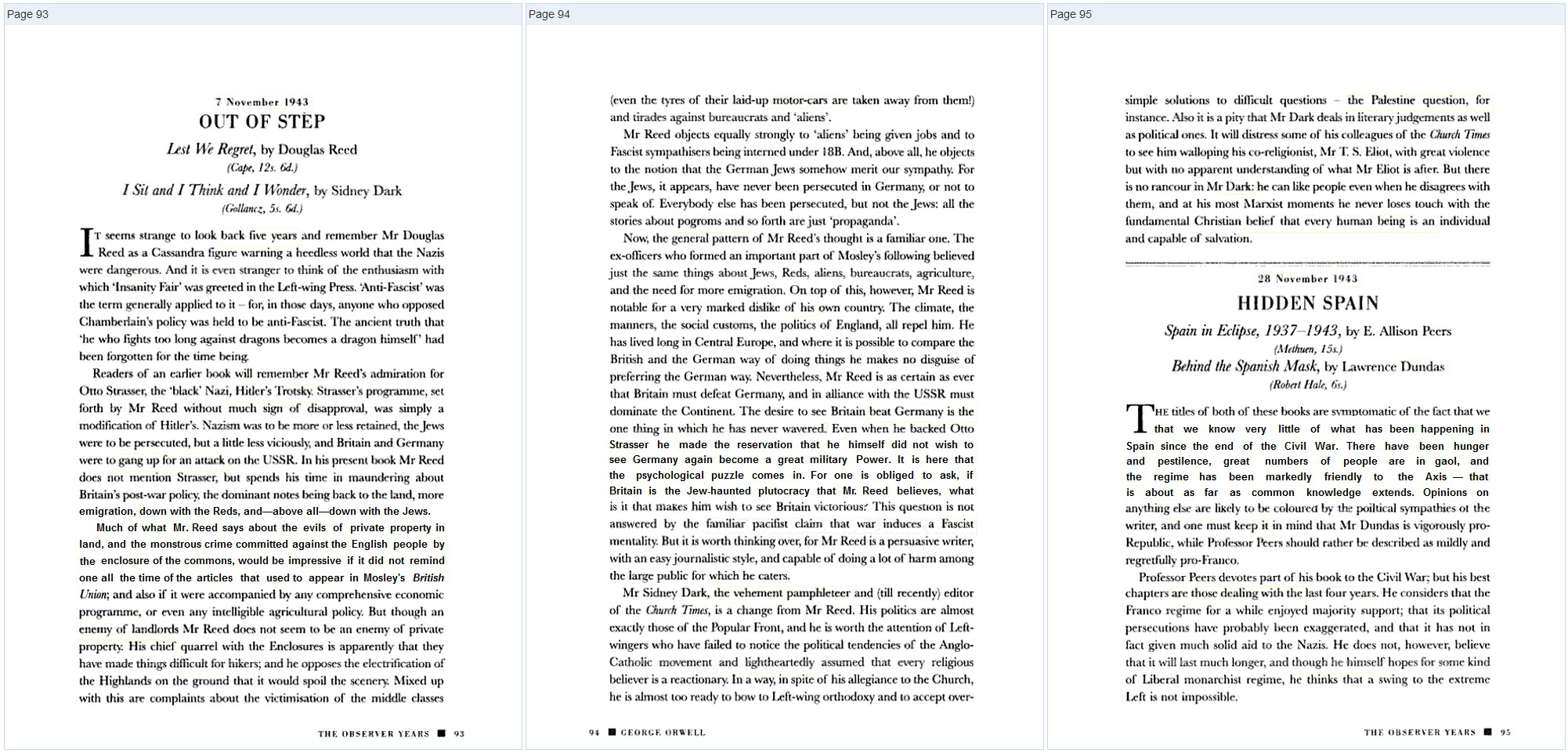The Observer, 7 November 1943
OUT OF STEP
Lest We Regret, by Douglas Reed
(Cape, 12s. 6d.)
It seems strange to look back five years and remember Mr. Douglas Reed as a Cassandra figure warning a heedless world that the Nazis were dangerous. And it is even stranger to think of the enthusiasm with which 'Insanity Fair' was greeted in the Left-wing Press. "Anti-Fascist" was the term generally applied to it—for in those days anyone who opposed Chamberlain's policy was held to be anti-Fascist. The ancient truth that "he who fights too long against dragons becomes a dragon himself" had been forgotten for the time being.
Readers of an earlier book will remember Mr Reed's admiration for Otto Strasser, the "black" Nazi, Hitler's Trotsky. Strasser's programme, set forth by Mr. Reed without much sign of disapproval, was simply a modification of Hitler's. Nazism was to be more or less retained, the Jews were to be persecuted, but a little less viciously, and Britain and Germany were to gang up for an attack on the USSR In his present book Mr. Reed does not mention Strasser, but spends his time in maundering about Britain's post-war policy, the dominant notes being back to the land, more emigration, down with the Reds and—above all—down with the Jews.
Much of what Mr Reed says about the evils of private property in land, and the monstrous crime committed against the English people by the enclosure of the commons, would be impressive if it did not remind one all the time of the articles that used to appear in Mosley's British Union; and also if it were accompanied by any comprehensive economic programme, or even any intelligible agricultural policy. But though an enemy of landlords Mr. Reed does not seem to be an enemy of private property. His chief quarrel with the Enclosures is apparently that they have made things difficult for hikers; and he opposes the electrification of the Highlands on the ground that it would spoil the scenery. Mixed up with this are complaints about the victimisation of the middle classes (even the tyres of their laid-up motor-cars are taken away from them!) and tirades against bureaucrats and 'aliens.'
Mr Reed objects equally strongly to 'aliens' being given jobs and to Fascist sympathisers being interned under 18B. And, above all he objects to the notion that the German Jews somehow merit our sympathy. Fot the Jews, it appears, have never been persecuted in Germany, or not to speak of. Everybody else has been persecuted, but not the Jews: all the stories about pogroms and so forth are just 'propaganda'.
Now, the general pattern of Mr Reed's thought is a familiar one. The ex-officers who formed an important part of Mosley's following believed just the same things about Jews, Reds, aliens, bureaucrats, agriculture, and the need for more emigration. On top of this, however, Mr. Reed is notable for a very marked dislike of his own country. The climate, the manners, the social customs, the politics of England, all repel him. He has lived long in Central Europe, and where it is possible to compare the British and the German way of doing things he makes no disguise of preferring the German way. Nevertheless, Mr Reed is as certain as ever that Britain must defeat Germany, and in alliance with the USSR must dominate the Continent. The desire to see Britain beat Germany is the one thing in which he has never wavered. Even when he backed Otto Strasser he made the reservation that he himself did not wish to see Germany again become a great military Power. It is here that the psychological puzzle comes in. For one is obliged to ask, if Britain is the Jew-haunted plutocracy that Mr Reed believes, what is it that makes him wish to see Britain victorious? This question is not answered by the familiar pacifist claim that war induces a Fascist mentality. But it is worth thinking over, for Mr Reed is a persuasive writer, with an easy journalistic style, and capable of doing a lot of harm among the large public for which he caters.
click image to enlarge



































